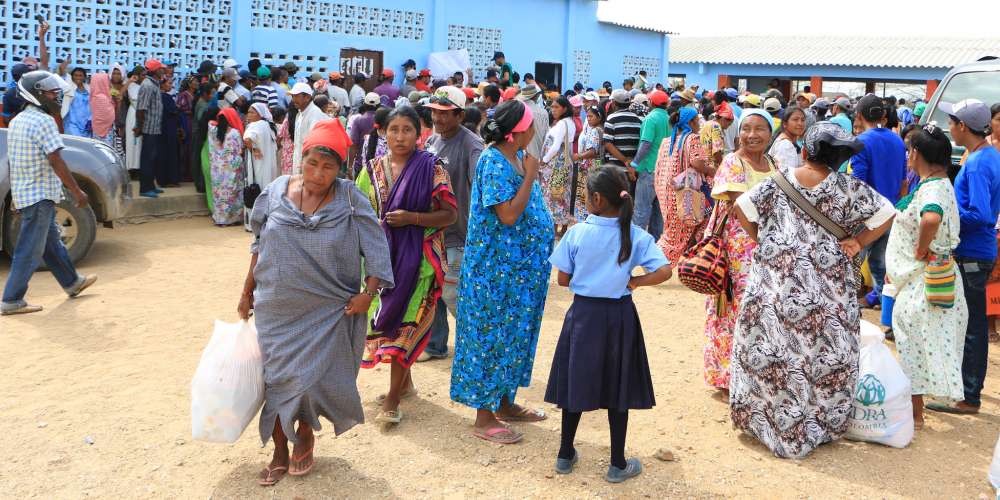
, with Inter-American Division staff
The Adventist Development and Relief Agency has delivered 52 tons of humanitarian aid to a remote region of Colombia where severe drought has killed hundreds of children over the past five years.
Colombia is suffering the worst drought in its history that scientists have blamed on the weather phenomenon El Niño. The country's hardest-hit region is La Guajira, located at the northern end of South America in a peninsula between Colombia and Venezuela.
ADRA, which previously delivered aid to hundreds of families in La Guajira in September 2014, returned to the area amid reports that 29 children had died of malnutrition during the first five months of 2016, said Gabriel Villarreal, Colombia country director for ADRA.
“The crippling drought combined with the closure of the border between Venezuela and Colombia has greatly affected … this area,” Villarreal said. “It really concerns us. Just to think that many of the young children in La Guajira have never seen rain is astonishing.”
Some 75 volunteers — coming from Columbia’s capital, Bogotá, and as far away as the U.S. island of Hawaii — made a five-day visit to five towns in La Guajira earlier this month, distributing food, clothes, and shoes, offering medical care and free medicine, and providing haircuts and recreational activities to thousands of families.
Local authorities in the towns of Uribia, Jujurá, Alta Guajira, Kamushino, and Puerto Nuevo expressed gratitude for the assistance.
“We are very grateful for the health impact that ADRA has brought,” said Nayla Sierra, a representative of Uribia’s health department, which joined ADRA workers in providing relief. “The city of Uribia is thankful for the humanitarian work you have been providing in different places where it’s difficult to enter.”
The project is historic for the Adventist Church and ADRA because it involved all 17 of the church’s conferences and missions across Colombia, Villarreal said. Each church entity collected funds and nonperishable items to benefit those in need in La Guajira. Villarreal said ADRA held several initial meetings with La Guajira authorities to identify the needs of the communities and then met with church leaders and volunteers to coordinate, transport, and deliver the goods.
He said the preliminary goal was to assist 2,400 families, or 12,000 people, but ADRA managed to distribute nonperishable food to 2,600 families, or 13,020 people. It also provided 956 medical consultations, 54 dental procedures, 3,966 free medical items, recreational activities for 640 children, and 1,000 clothing and shoe items to 1,900 children.
Many people left their homes before dawn to line up to receive medical attention and other assistance.
“This means so much to us, thank you for helping us,” said Lucia Fuentes, who is from a family of 15 and was among 773 families who received aid in Jujurá. In addition to food, she and her family received free medical screenings and haircuts.
Without volunteers, the project would not have been possible, Villarreal said.
Among the volunteers was Jenny Bonilla, a psychologist in Bogotá, who signed up after seeing a flyer in her daughter’s school. She initially wasn’t sure if non-Adventists could participate, but ADRA’s Bogotá office approved her application and she bought a ticket to La Guajira.
While in La Guajira, she fell ill and spent four days in the hospital. But she said God healed her.
“He wanted me to be here to serve and learn how so many of us are blessed,” Bonilla said.
Colombian native Angelica de Jesus traveled from Hawaii, where she is stationed with the U.S. military.
“I had been looking for a while for opportunities to serve, and when I found out from a friend back home in Colombia about this ADRA project, I did everything I could to come,” said de Jesús.
“The greatest gift is to see the smiles on the faces of these people who we are helping,” she said. “It’s really the best payment that we could receive for what we are doing here.”
Smiling is not common in Puerto Nuevo, said Josefina Palmar Pushaina, a Wayuu woman who is nine months pregnant with twins. She was accompanied to the ADRA distribution center by her three children, husband, and mother.
“There’s no happiness here,” she said. “What we have here is a need for help. We are thankful to ADRA Colombia for the help, but we need more. We need water, food, and work.”
She said not a drop of rain has fallen in Puerto Nuevo in five years.
“The land is not good for planting, and there’s no work anywhere,” she said.
She dreams for her children to have a better future.
ADRA does not see this as simply a second humanitarian effort, Villarreal said. He said ADRA was looking to turn this month’s project into a rehabilitation project and later a development project. Water supply and basic sanitation projects are at the top of ADRA’s list of priorities. Efforts to make sure children are properly nourished and to establish economic development projects for craftswomen and men will follow.
“We are happy to provide this aid in time of emergency, but we also want these communities to return to their normal lives when there is no drought,” Villarreal said.